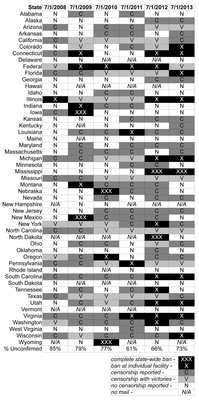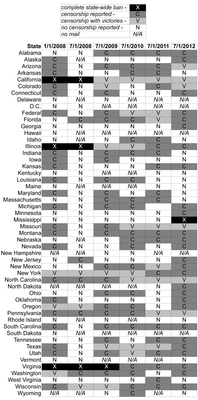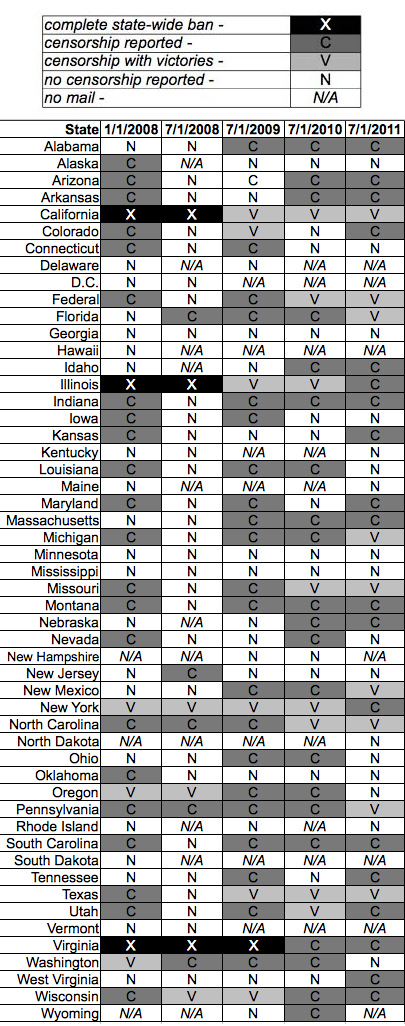
2013 Censorship Report
As a mail-based prisoner support organization, the ability to get our mail in to our comrades and subscribers is an essential part of our ability to organize. If we can’t get mail in, we can’t help lead the anti-imperialist struggle behind bars. We are under no illusion that we’ll ever be free from censorship; if our enemy hates us, we’re probably doing something right! But the U.$. Constitution and our humynist morality support our insistence on fighting censorship as much as possible so that we can have as big of an impact on the international revolutionary movement as we can.
Often times our subscribers don’t even know how much censorship they persynally are experiencing, let alone what’s going on around the country. Our annual censorship report gives our subscribers an idea of how much political repression we’re facing overall.
This year we started recording our mail in more detail, and removed a lot of flaws in how the data is aggregated (although it’s not perfect!). At the bottom of the chart, “% Unconfirmed” tells you how accurate the snapshot is for that reporting year; the lower number the better, because a lower percent of unconfirmed mail means we actually know what happened to more of the mail we’ve sent in. Unconfirmed mail not only covers up censorship in cases where the prisoner never got the mail but we haven’t been made aware of it; it also may exaggerate the level of censorship we’re actually facing in a particular facility or state where our mail is actually getting in to some people but they haven’t told us. Of course we know the content of our literature is not held in high regard by most prison staff, so assuming we’re being censored when we aren’t sure what is going on is probably more accurate than not.
A facility is considered to be banning our literature for that reporting year if they have censored two or more items, and no items have been confirmed as received. An entire state is considered to be banning our literature if they have censored any mail, and no mail has been reported as received. Another note on the chart: it is only a snapshot of what is going on with our mail. A facility might be banning us in the same state where we also had victories, or a complete statewide ban may only actually affect a few subscribers (plus the potential new subscribers we might gain if our lit wasn’t censored).
To improve our data on the level of censorship we’re experiencing, you may receive a list from us of mail we’ve sent you, asking you to confirm receipt or censorship of each item. This list is called an Unconfirmed Mail Form (UMF). We recommend everyone keep a log of all your mail, incoming and outgoing, with dates received/sent, from/to who, and contents. That way if your mail with us, or anyone, is tampered with, you are one step ahead of the game. And if you get a UMF, you will be able to fill it out accurately rather than guessing. But do not wait to receive a UMF to tell us what you’ve gotten! When you write to us, you should always tell us what you’ve gotten from us since the last time you wrote. That will save time and money so we can send in more books and literature.
Facilities banning all our mail in the last reporting year:
-
Colorado - Arkansas Valley State Prison
-
Connecticut - Northern Correctional Institution and Northern Supermax
this is the second consecutive year in Northern Supermax
-
Florida - Suwanee Annex
-
Illinois - Menard Correctional Center (two years in a row)
-
Michigan - Gus Harrison Correctional Facility
-
South Carolina - Leiber Correctional Institution
-
Utah - Central Utah Correctional Facility
-
Virginia - Hampton Roads Regional Jail (two years in a row)
-
Wisconsin - Green Bay Correctional Institution and Kettle Moraine
Correctional Institution
Facilities banning ULK in the last reporting year:
-
Connecticut - MacDougall-Walker Correctional Institution
Reason: “Rejected publication per the Media Review Board”
-
Florida - Franklin Correctional Institution
Reason: MIM investigated as Security Threat Group
-
Florida - Jackson Correctional Institution
No reason given
-
Illinois - Menard Correctional Center
Reasons: “Threat to safety and security”
-
Michigan - G Robert Correctional Facility
No reason given
-
New York - Riverview Correctional Facility
Reasons: “Incites disobedience, describes gang activity”
-
North Carolina - Marion Correctional Institution
Reasons: “MIM Distributors on disapproved publication list,” “encourages insurrection”
-
North Carolina - Warren Correctional Institution
Reason: “On ban list”
-
Pennsylvania - State Correctional Institution Waymart
Reasons: “Unauthorized enclosure” and no reason given
-
Wisconsin - Wisconsin Secure Program Facility
No reason given
Florida is also attempting to classify Under Lock & Key as a “Security Threat Group,” which would likely make all mail from MIM Distributors banned as gang-related, and subject anyone in possession of mail from us to disciplinary action. We have not received an update on this process since April. We do know that for a couple years Florida was a booming United Struggle from Within state, and some of our more active comrades have recently asked to be removed from our mailing list for fear of repression. We aren’t sure whether the administration is threatening parole eligibility or physical abuse, or other forms of torture such as solitary confinement; or if they’ve already gone ahead and beaten the shit out of these comrades to get them to stop talking to us. Yet we’ve seen this enough times to know that something like that is going on. It’s incredible the lengths Amerikans will go to to keep someone who’s already locked up in prison from doing something as innocuous as reading a newsletter, participating in a study group, and talking to other humyn beings.
A popular reason for citing censorship in Nevada has been “Per AR 750… Address labels are unauthorized.” Our guess is that this policy of the Nevada Department of Corrections would not hold up in court as being reasonably related to penological interests and the safety of the institution. A subscriber in Nevada who has been missing mail due to this rule should take on this struggle in a lawsuit! Another comrade in that state reported that prison officials have admitted ULK is not banned, but now they are resorting to “unofficial censorship” by simply throwing out incoming and outgoing mail. This is another reason why it’s important to track your correspondence.
Victories and Struggles
Appealing censorship and filing grievances can lead to small but significant victories. The victories in Arizona, Pennsylvania, and on the Federal level are attributed solely to prisoners filing appeals of the censorship, without any supporting letters from MIM Distributors. Of course not all appeals will be granted, and we don’t expect to ever be completely free of censorship from the state. But we encourage everyone to at least attempt to appeal all censorship of their mail. Send us copies of your documents and we can publicize and track them on our website www.prisoncensorship.info.
In the last year we’ve focused much energy on fighting censorship in Missouri and North Carolina. In Missouri we’ve met some success with letter writing, but in North Carolina it has been a different story. After a surge in USW activity in North Carolina, every issue of Under Lock & Key has been placed on their ban list for over 3 years straight. Upon appeal, not only do North Carolina prisoncrats tend to simply uphold the decision of the lower level with no explanation, but when asked to explain how their “independent” review process works, we are given no response. When we filed a public records request with the state, the only documents they had to demonstrate that the independent review process existed was a stack of the original censorship notifications, further putting into question the existence of the “review process.” We have comrades working on this case in North Carolina who could benefit greatly from some additional legal assistance.
Multiple subscribers in Illinois have volunteered to assist MIM(Prisons) in fighting censorship in that state, and one has two lawsuits pending on this issue. While ULK is not getting in at all in some facilities in the state, some of our subscriber-volunteers are able to receive ULK and copies of the censor documentation. Also they are intimately familiar with the mail rules and appeal procedures in their state. Although it is a slower process for volunteers on theinside working via mail, this has been a very beneficial campaign, and one that anyone with legal knowledge can contribute to in their own state. MIM(Prisons) facilitates a Prisoners’ Legal Clinic (PLC) to help jailhouse lawyers plug into projects that will push forward the collective legal knowledge and experience of the anti-imperialist movement behind bars. Write in to get involved! Any lawyer or law student who is interested in helping prisoners push forward these anti-censorship lawsuits should contact us.










